Anpassungsfähigkeit und Resilienz des Finanzsystems
Diese Forschungsgruppe untersucht kritische Aspekte der Anpassungsfähigkeit und Widerstandsfähigkeit von Finanzsystemen. Sie analysiert die Auswirkungen von Naturkatastrophen auf Finanzsysteme, die Auswirkungen politischer Präferenzen für die grüne Transformation und die Bedeutung von Kultur in den Volkswirtschaften.
Forschungscluster
Finanzresilienz und RegulierungIhr Kontakt

- Abteilung Finanzmärkte
PROJEKTE
08.2022 ‐ 07.2025
OVERHANG: Schuldenüberhang und grüne Investitionen – die Rolle von Banken für den klimafreundlichen Umgang mit emissionsintensiven Anlagenvermögen
Bundesministerium für Bildung und Forschung (BMBF)
Ziel von OVERHANG ist es, die Rolle von Banken für den klimafreundlichen Umgang mit emissionsintensiven Anlagevermögen zu untersuchen. Hierdurch sollen politikrelevante Erkenntnisse zu Finanzregulierung, staatlich kontrollierter Kreditvergabe und Finanzstabilität identifiziert sowie eine Sensibilisierung der verschuldeten Akteurinnen und Akteuren erreicht werden.
Das Projekt wird vom Bundesministerium für Bildung und Forschung (BMBF) finanziert.
01.2015 ‐ 12.2019
Interactions between Bank-specific Risk and Macroeconomic Performance
Deutsche Forschungsgemeinschaft (DFG)
07.2016 ‐ 12.2018
Relationship Lenders and Unorthodox Monetary Policy: Investment, Employment, and Resource Reallocation Effects
Leibniz-Gemeinschaft
We combine a number of unique and proprietary data sources to measure the impact of relationship lenders and unconventional monetary policy during and after the European sovereign debt crisis on the real economy. Establishing systematic links between different research data centers (Forschungsdatenzentren, FDZ) and central banks with detailed micro-level information on both financial and real activity is the stand-alone proposition of our proposal. The main objective is to permit the identification of causal effects, or their absence, regarding which policies were conducive to mitigate financial shocks and stimulate real economic activities, such as employment, investment, or the closure of plants.
Referierte Publikationen
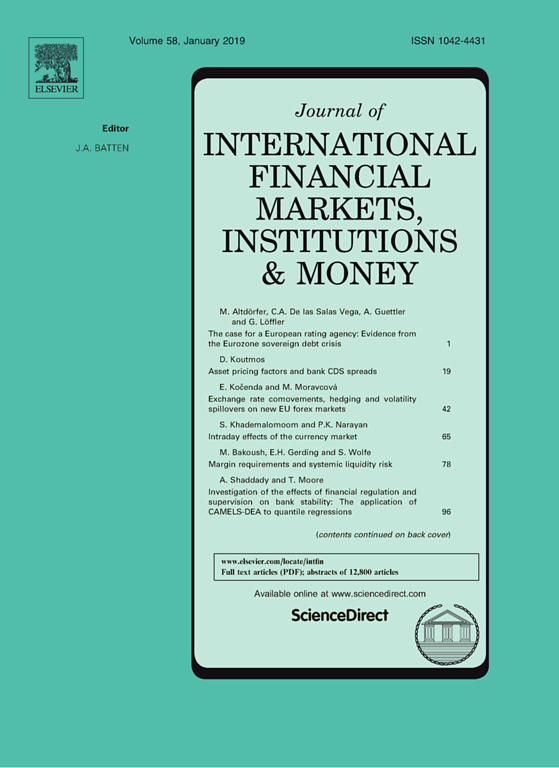
Loan Syndication under Basel II: How Do Firm Credit Ratings Affect the Cost of Credit?
in: Journal of International Financial Markets, Institutions and Money, May 2021
Abstract
This paper investigates how syndicated lenders react to borrowers’ rating changes under heterogeneous conditions and different regulatory regimes. Our findings suggest that corporate downgrades that increase capital requirements for lending banks under the Basel II framework are associated with increased loan spreads and deteriorating non-price loan terms relative to downgrades that do not affect capital requirements. Ratings exert an asymmetric impact on loan spreads, as these remain unresponsive to rating upgrades, even when the latter are associated with a reduction in risk weights for corporate loans. The increase in firm borrowing costs is mitigated in the presence of previous bank-firm lending relationships and for borrowers with relatively strong performance, high cash flows and low leverage.

The State Expropriation Risk and the Pricing of Foreign Earnings
in: Journal of International Accounting Research, Nr. 2, 2021
Abstract
We examine the pricing of U.S. multinational firms' foreign earnings in regard to their risk of expropriation and unfair treatment by the governments of the countries in which their international subsidiaries are located. Using 8,891 firm-years observations during the 2001–2013 period, we find that the value relevance of foreign earnings increases with the improvement of the protection from state expropriation risk in the subsidiary host-countries. Our results are not driven by the earnings management practice, investor distraction, country informativeness, and political and trade relationship of a foreign country with the U.S. Furthermore, our results are robust to the confounding effects of country factors, measurement error in the variable of the risk of expropriation, the influence of private contracting institutions, and endogeneity in the decision of the location of subsidiaries.
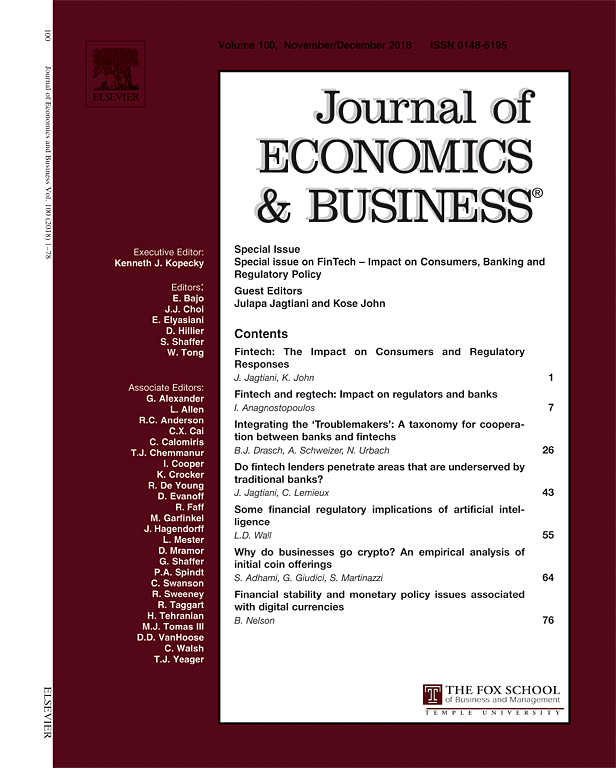
Finance-Growth Nexus and Banking Efficiency: The Impact of Microfinance Institutions
in: Journal of Economics and Business, March-April 2021
Abstract
This paper investigates the relative importance of microfinance institutions (MFIs) at both the macro (financial development, economic growth, income inequality, and poverty) and micro levels (efficiency of traditional commercial banks). We observe a significant impact on most of the fronts. MFIs’ participation increases overall savings (total bank deposits) and credit allocation (loans to private sector) in the economy. Their involvement enhances economic welfare by reducing income inequality and poverty. Additionally, their active presence helps to discipline the traditional commercial banks by subjecting them to more competition triggering higher efficiency.

The Real Impact of Ratings-based Capital Rules on the Finance-Growth Nexus
in: International Review of Financial Analysis, January 2021
Abstract
We investigate whether ratings-based capital regulation has affected the finance-growth nexus via a foreign credit channel. Using quarterly data on short to medium term real GDP growth and cross-border bank lending flows from G-10 countries to 67 recipient countries, we find that since the implementation of Basel 2 capital rules, risk weight reductions mapped to sovereign credit rating upgrades have stimulated short-term economic growth in investment grade recipients but hampered growth in non-investment grade recipients. The impact of these rating upgrades is strongest in the first year and then reverses from the third year and onwards. On the other hand, there is a consistent and lasting negative impact of risk weight increases due to rating downgrades across all recipient countries. The adverse effects of ratings-based capital regulation on foreign bank credit supply and economic growth are compounded in countries with more corruption and less competitive banking sectors and are attenuated with greater political stability.

Transactional and Relational Approaches to Political Connections and the Cost of Debt
in: Journal of Corporate Finance, December 2020
Abstract
This paper examines the economic effects of a firm's approach to developing and maintaining political connections. Specifically, we investigate whether lenders favor transactional connection as opposed to relational connection. By tracing firms in a politically volatile emerging democracy in Indonesia, we find that firms following a transactional political connection strategy experience a relatively lower cost of debt than those with a relational strategy. The effect is more pronounced for firms facing high financial distress. The finding is robust to cost of bank loans and a variety of regression methods. Overall, the evidence suggests that in times of frequently changing political regimes, firms benefit from a transactional relationship with politicians as it enables to update connection with the government in power. Relational connection is valuable for a firm only when the political regime connected with it gains power.
Arbeitspapiere

Covered Bonds and Bank Portfolio Rebalancing
in: Norges Bank Working Papers, Nr. 6, 2021
Abstract
We use administrative and supervisory data at the bank and loan level to investigate the impact of the introduction of covered bonds on the composition of bank balance sheets and bank risk. Covered bonds, despite being collateralized by mortgages, lead to a shift in bank lending from mortgages to corporate loans. Young and low-rated firms in particular receive more credit, suggesting that overall credit risk increases. At the same time, we find that total balance sheet liquidity increases. We identify the channel in a theoretical model and provide empirical evidence: Banks with low initial liquidity and banks with sufficiently high risk-adjusted return on firm lending drive the results.

Cultural Resilience, Religion, and Economic Recovery: Evidence from the 2005 Hurricane Season
in: IWH Discussion Papers, Nr. 9, 2021
Abstract
This paper investigates the critical role of religion in the economic recovery after high-impact natural disasters. Exploiting the 2005 hurricane season in the southeast United States, we document that establishments in counties with higher religious adherence rates saw a significantly stronger recovery in terms of productivity for 2005-2010. Our results further suggest that a particular religious denomination does not drive the effect. We observe that different aspects of religion, such as adherence, shared experiences from ancestors, and institutionalised features, all drive the effect on recovery. Our results matter since they underline the importance of cultural characteristics like religion during and after economic crises.
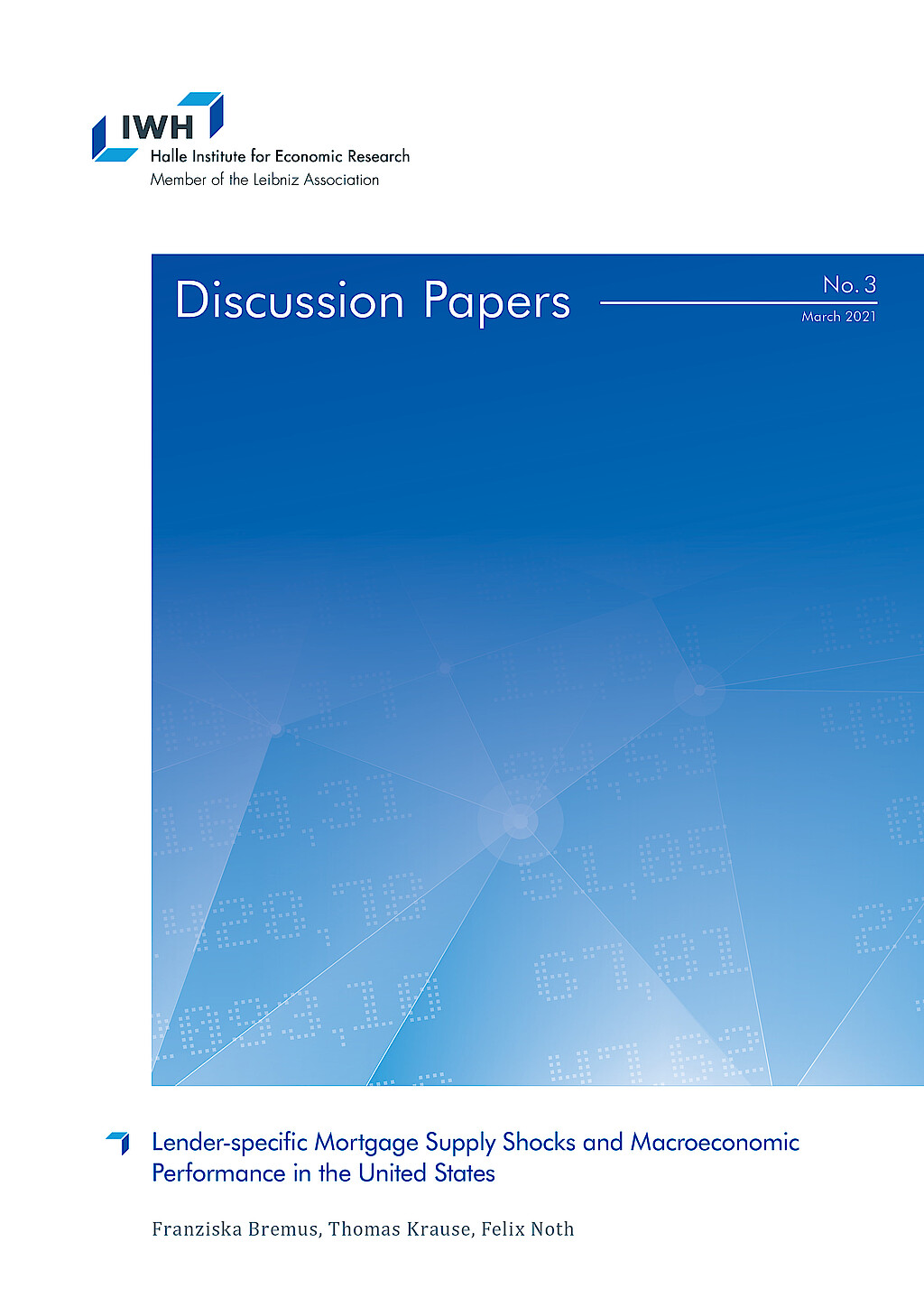
Lender-specific Mortgage Supply Shocks and Macroeconomic Performance in the United States
in: IWH Discussion Papers, Nr. 3, 2021
Abstract
This paper provides evidence for the propagation of idiosyncratic mortgage supply shocks to the macroeconomy. Based on micro-level data from the Home Mortgage Disclosure Act for the 1990-2016 period, our results suggest that lender-specific mortgage supply shocks affect aggregate mortgage, house price, and employment dynamics at the regional level. The larger the idiosyncratic shocks to newly issued mortgages, the stronger are mortgage, house price, and employment growth. While shocks at the level of shadow banks significantly affect mortgage and house price dynamics, too, they do not matter much for employment.
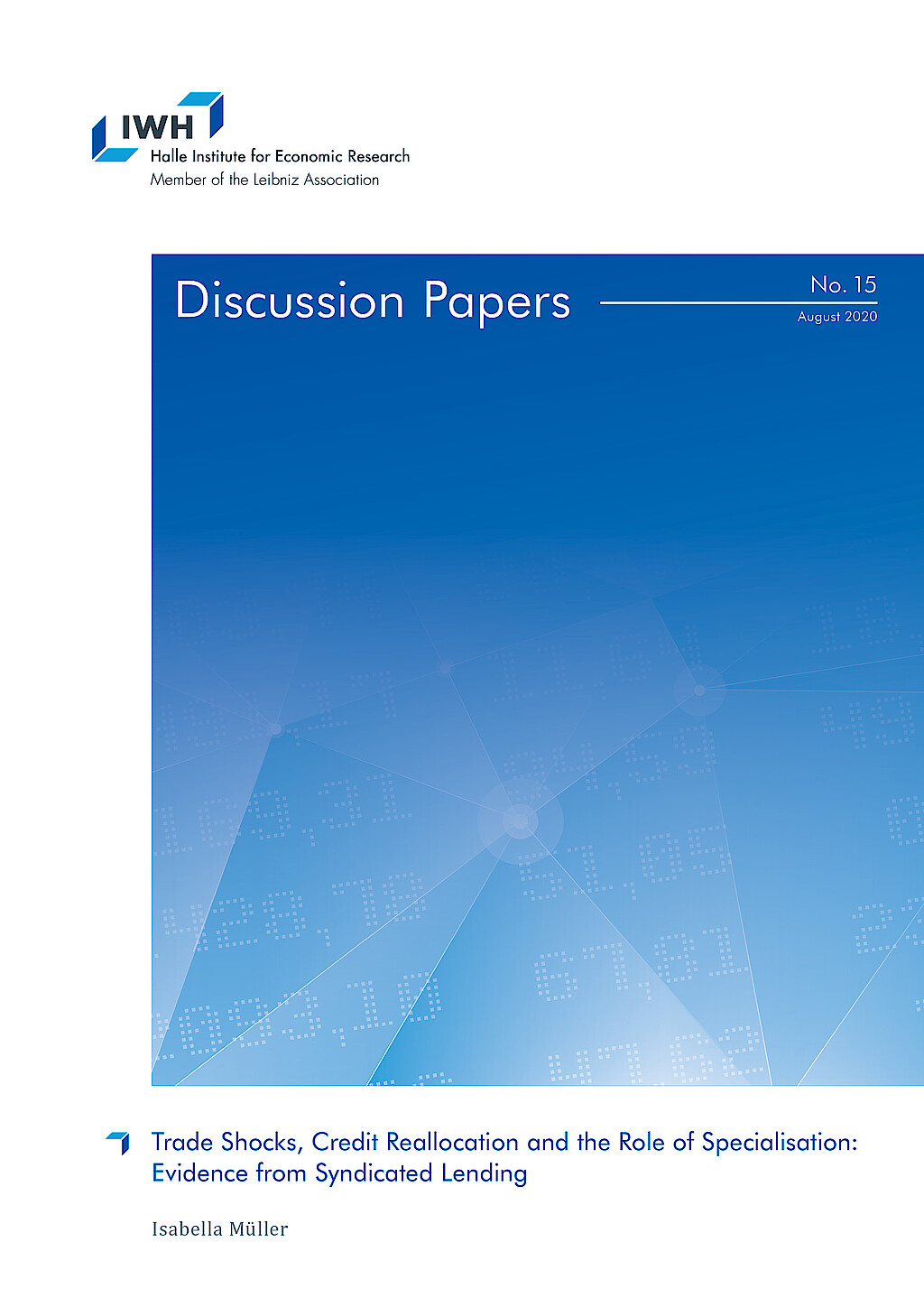
Trade Shocks, Credit Reallocation and the Role of Specialisation: Evidence from Syndicated Lending
in: IWH Discussion Papers, Nr. 15, 2020
Abstract
This paper provides evidence that banks cut lending to US borrowers as a consequence of a trade shock. This adverse reaction is stronger for banks with higher ex-ante lending to US industries hit by the trade shock. Importantly, I document large heterogeneity in banks‘ reaction depending on their sectoral specialisation. Banks shield industries in which they are specialised in and at the same time reduce the availability of credit to industries they are not specialised in. The latter is driven by low-capital banks and lending to firms that are themselves hit by the trade shock. Banks‘ adjustments have adverse real effects.
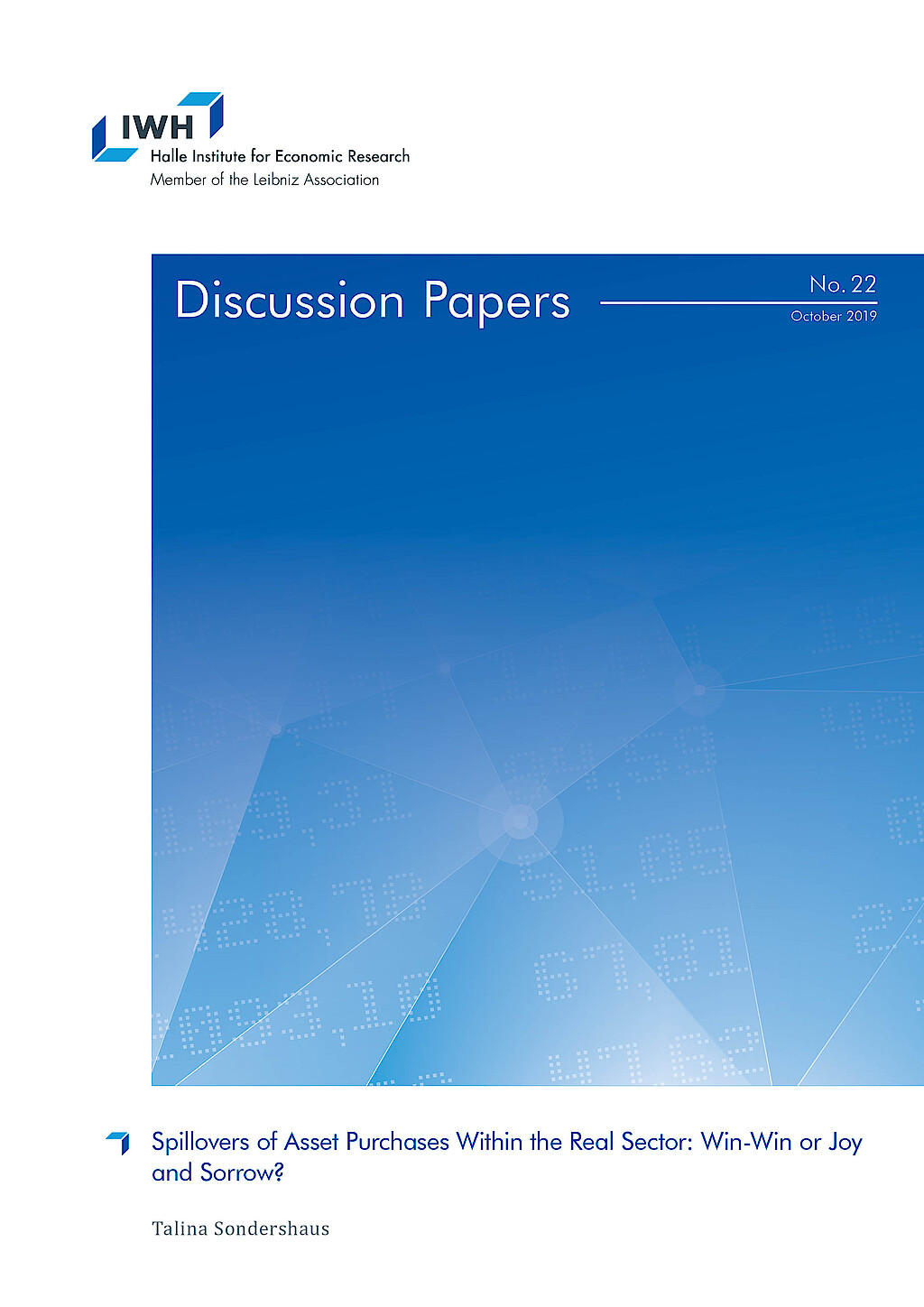
Spillovers of Asset Purchases Within the Real Sector: Win-Win or Joy and Sorrow?
in: IWH Discussion Papers, Nr. 22, 2019
Abstract
Events which have an adverse or positive effect on some firms can disseminate through the economy to firms which are not directly affected. By exploiting the first large sovereign bond purchase programme of the ECB, this paper investigates whether more lending to some firms spill over to firms in the surroundings of direct beneficiaries. Firms operating in the same industry and region invest less and reduce employment. The paper shows the importance to consider spillover effects when assessing unconventional monetary policies: Differences between treatment and control groups can be entirely attributed to negative effects on the control group.



















